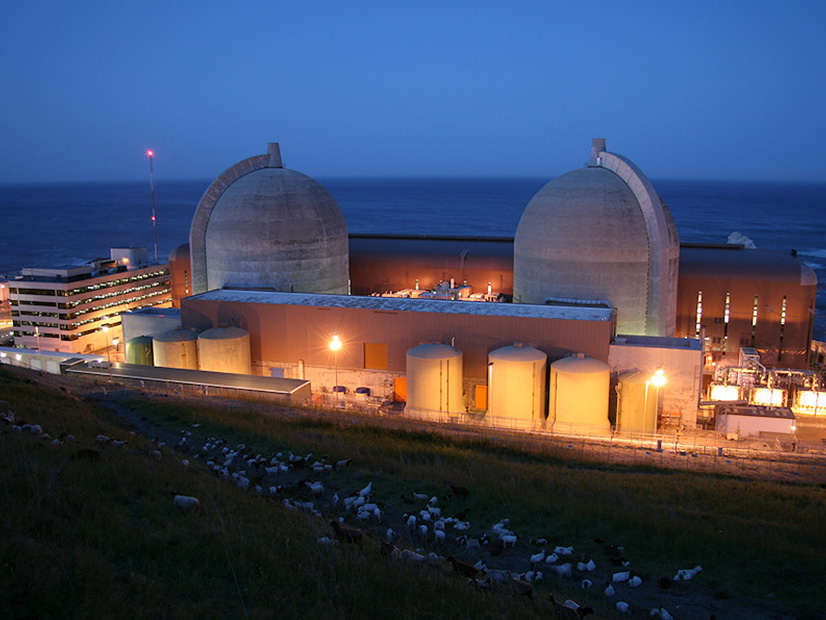California utility regulators on Dec. 14 approved extending operations at the Diablo Canyon nuclear power plant through 2030, a move intended to bolster reliability as the state continues its clean energy transition.
The California Public Utilities Commission voted 3-0 to authorize an extension for Diablo Canyon, which is owned and operated by Pacific Gas and Electric. The 2,200-MW power plant provides about 9% of California’s in-state generation.
Diablo Canyon had been slated to close in stages in 2024 and 2025. But state officials, including Gov. Gavin Newsom (D), called for keeping the state’s last nuclear power plant open to support reliability. Energy shortfalls led to rolling blackouts in California in August 2020 and close calls in subsequent summers.
Senate Bill 846, which Newsom signed in September 2022, directed the CPUC to authorize an extension for Diablo Canyon by Dec. 31, 2023. The bill described the extension as a “stopgap” measure of up to five years aimed at improving energy system reliability while more renewable and zero-carbon resources come online.
The extension approved by the commission runs through October 2029 for the power plant’s Unit 1 and October 2030 for Unit 2.
CPUC President Alice Reynolds noted that SB 846 included detailed directives for the commission to follow.
“We’re doing as much as we can to move quickly to reduce and eliminate the use of fossil gas to generate electricity while ensuring reliability and controlling costs for ratepayers,” Reynolds said before the vote. “But we’re also considering this decision before us today at the direction of the legislature.”
PG&E still needs approval from the Nuclear Regulatory Commission to extend operations. The company filed a license renewal application with the NRC on Nov. 7.
CPUC plans to continue evaluating the costs of the extension as more information comes in, and whether those have become “too high to justify incurring,” as SB 846 directs. Additional costs could include the expense of meeting conditions for NRC license renewal or implementing recommendations of the Diablo Canyon Independent Safety Commission.
In making its decision, the CPUC considered a report from the California Energy Commission (CEC) on whether the Diablo Canyon extension was needed to support reliability.
The analysis, completed in February, found that ordered procurement is sufficient to meet current resource adequacy planning standards through 2030.
But shortfalls are possible if the state experiences heat waves similar to those in 2020 or 2022, the report concluded. That risk is even greater if wildfires reduce transmission capacity at the same time.
In addition, new clean energy resources might be delayed due to supply chain, interconnection and permitting problems. Another issue is the ability of load-serving entities “to secure imports in an increasingly competitive Western market,” the report said.
“Extending [Diablo Canyon] has a decided advantage in the sense that it is a firm, low-carbon resource,” the CEC report said. “This extension allows the state to rely less on natural gas and more on clean resources for the grid.”
Before the vote, the CPUC heard from members of the public who opposed a Diablo Canyon extension due to concerns about the risks of earthquakes, terrorism or sabotage.
One speaker, who lives near the central coast nuclear plant, said the state has plenty of renewable resources and battery storage to meet its energy needs.
“Why put us at risk when we no longer need the nuclear plant?” she asked.
But others supported a Diablo Canyon extension, saying the state will rely more on natural gas resources if the nuclear plant closes.
One speaker said shutting down Diablo would be inconsistent with a pledge by the U.S. and more than 20 other countries during COP28 this month to work toward tripling global nuclear energy capacity by 2050.




